
(If you are wondering, the image of me above was taken when I used to work at KISSmetrics with Hiten Shah… I used to have hair)
In early January 2017, I purchased the KISSmetrics website for $500,000.
If you go to the site, you’ll notice that it forwards here to NeilPatel.com (which I will get into later in the post).
The $500,000 didn’t get me the company, KISSmetrics, or any of the revenue streams. The parent company, Space Pencil, is continually improving and developing the product.
And on top of that, there are restrictions. I can’t just pop up a competing company or any company on the KISSmetrics site.
So why did they sell me the domain? And why would I pay $500,000 for it?
I can’t fully answer why they sold it, but I do know a lot of their customers came from word of mouth, conferences, paid ads, and other forms of marketing that didn’t include SEO or content marketing.
For that reason, the domain probably wasn’t as valuable to them as it was to me. And of course, who wouldn’t want extra cash?
I’m assuming they are very calculated because they are an analytics company, so they probably ran the numbers on how much revenue the inbound traffic was generating them and came to the conclusion that the $500,000 price tag seemed worth it.
Now, before I get into why I spent $500,000 on the domain, let me first break down my thought process as I am buying out a lot of properties in the marketing space (more to be announced in the future).
Why am I buying sites that aren’t generating revenue?
This wasn’t the first or the last site that I’ll buy in the space.
I recently blogged about how I bought Ubersuggest. And it wasn’t generating a single dollar in revenue.
Well technically, there were ads on the site, but I quickly killed those off.
And eventually, I ported it over to NeilPatel.com.
When I am looking at sites to buy, I am only looking for 1 thing… traffic. And of course, the quality (and relevancy) of that traffic.
See, I already have a revenue stream, which is my ad agency, Neil Patel Digital.
So, my goal is to find as many sites that have a similar traffic profile to NeilPatel.com and leverage them to drive my agency more leads.
How do you know you won’t lose money?
I don’t!
This approach doesn’t guarantee I’ll make more money.
I look at the business as tons of tiny experiments. You don’t build a huge business through one simple marketing strategy or tactic.
You have to combine a lot of little things to get your desired outcome.
And sometimes you’ll make mistakes along the way that will cost you money, which is fine. You have to keep one thing in mind… without testing, you won’t be big.
With my ad agency, we tend to mainly have U.S. clients. Yes, we serve other regions as well… for example, we have an ad agency in Brazil.
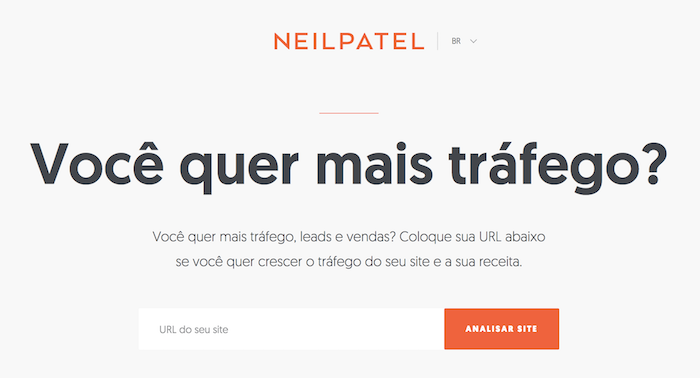
But I myself mainly focus on driving traffic to the U.S. ad agency, and the other teams just replicate as I don’t speak Portuguese, German, or any of the required languages for the other regions we are in.
So, when I buy companies, I look for traffic that is ideally in the U.S.
Sure, the ad agency can work with companies in Australia, Canada, and even the United Kingdom, but it’s tough.
There’s a huge difference in currency between Australia and the U.S. and the same goes for Canada.
And with the U.K. there is a 5 to 8-hour time zone difference, which makes it a bit more difficult to communicate with clients.
That’s why when I buy a site, I’m ideally looking for U.S. traffic.
When I bought Ubersuggest it had very little U.S. traffic. Indonesia and India were the two most popular regions.
But I bought it because I knew I could build a much better tool and over time grow the U.S. traffic by doing a few email blasts, getting on Product Hunt, and by creating some press.
And I have…
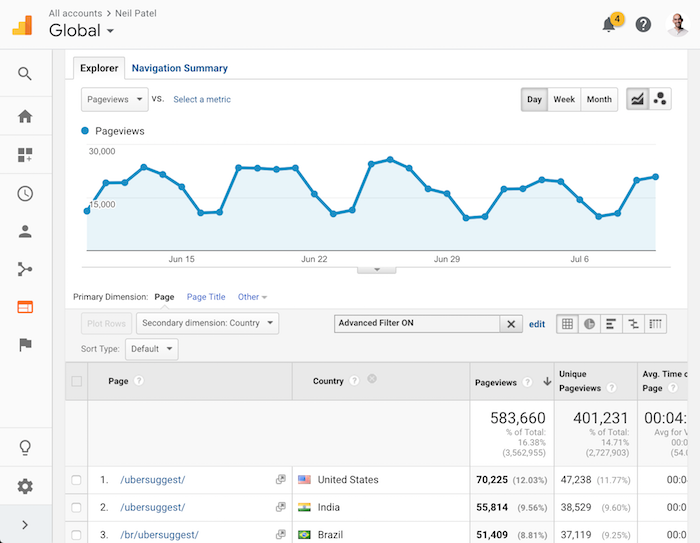
As you can see from the screenshot above, U.S. is the most popular region followed by India and Brazil.
Over time it shouldn’t be too difficult to 3 or even 4x that number as long as I release more features.
Now, my costs on Ubersuggest have gotten into the 6 figures per month, and I am not generating any income from it.
There is no guarantee that it will generate any revenue, but I have a pretty effective sales funnel, which I will share later in the post. Because of that sales funnel my risk with Ubersuggest is pretty low.
As long as I can grow the traffic enough, I should be able to monetize.
What about KISSmetrics?
As for KISSmetrics, I mainly bought the domain for the blog traffic.
During its peak it was generating 1,260,681 unique visitors per month:
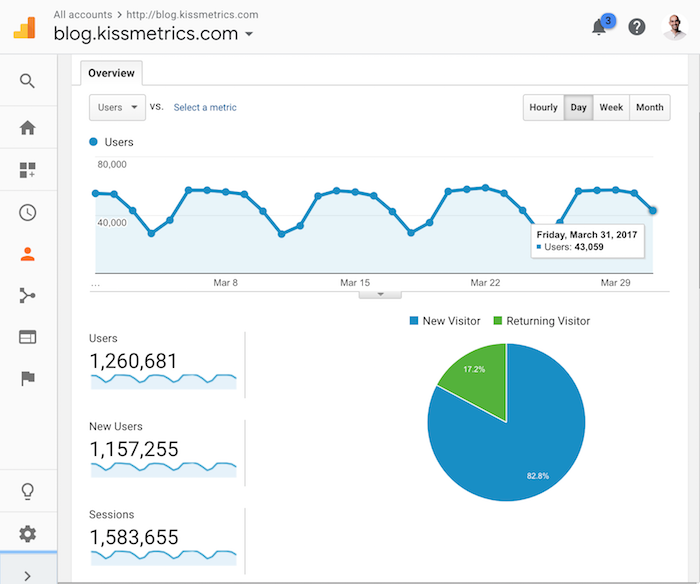
By the time I bought the blog, traffic had dropped to 805,042 unique visitors per month:
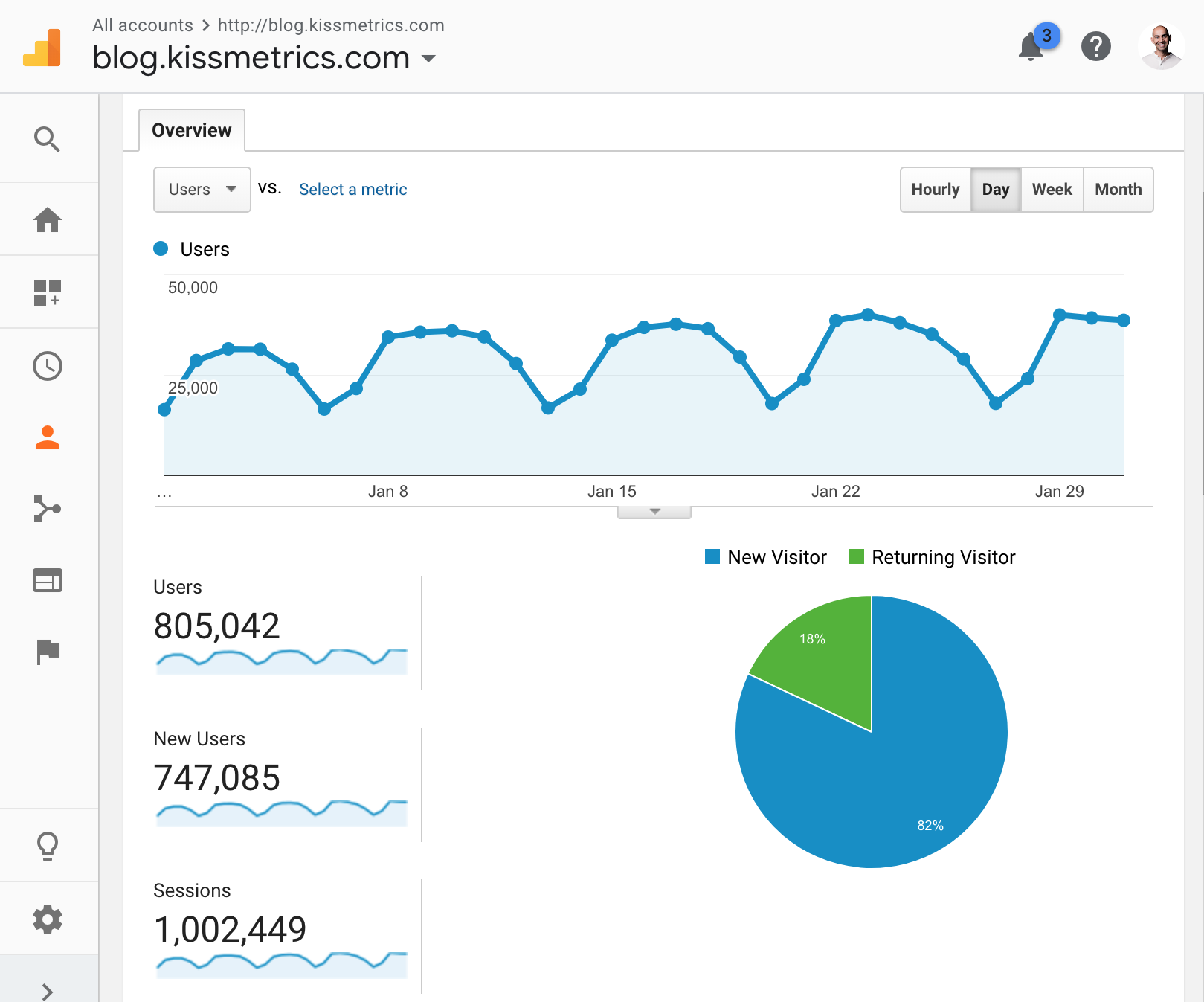
That’s a 36% drop in traffic. Ouch!
And then to make matters worse, I decided that I wanted to cut the traffic even more.
There were so many articles on KISSmetrics that were outdated and irrelevant, so I had no choice but to cut them.
For example, there were articles about Vine (which Twitter purchased and killed), Google Website Optimizer (no longer exists), Mob Wars (a Facebook game that no longer exists)… and the list goes on and on.
In addition to that, I knew that I could never monetize irrelevant traffic. Yes, more traffic is good, but only as long as it is relevant.
I instantly cut the KISSmetrics blog in half by “deleting” over 1,024 blog posts. Now, I didn’t just delete them, I made sure I added 301 redirects to the most relevant pages here on NeilPatel.com.
Once I did that, my traffic dropped again. I was now sitting at 585,783 unique visitors a month.
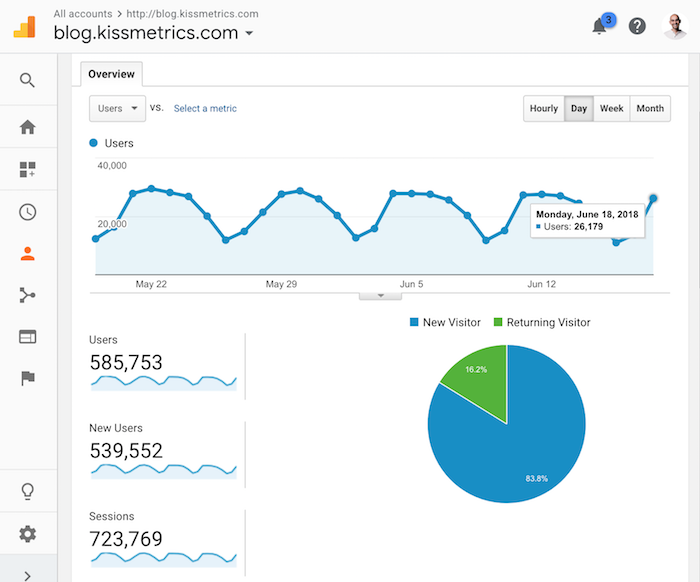
It sucks, but it had to be done. The last thing I wanted to do was spend time and money maintaining old blog posts that would never drive a dollar in revenue.
I knew that if someone was going to come to my blog to research Vine, there was little to no chance that the person would convert into a 6-figure consulting contract.
After I pruned and cropped the KISSmetrics blog, I naturally followed the same path of Ubersuggest and merged it in to NeilPatel.com.
The merge
The KISSmetrics merge was a bit more complicated than Ubersuggest.
With Ubersuggest, I didn’t have a keyword research tool on NeilPatel.com, so all I had to do was slap on a new design, add a feature or two, and port it over.
With KISSmetrics, a lot of the content was similar to NeilPatel.com. For the ones that were similar, I kept the NeilPatel.com version considering this blog generates more traffic than the KISSmetrics one.
As for all of the content that was unique and different, I ended up moving it over and applying 301 redirects.
If I decided to skip the pruning and cropping stage that I described above, the KISSmetrics blog would have had more traffic. And when I merged it in with NeilPatel.com I would have done even better.
But in marketing you can can’t focus on vanity metrics like how many more unique visitors you are getting per month. You need to keep your eye on the prize.
And for me, that’s leads.
The more leads I generate for my ad agency, the more likely I’ll increase my revenue.
Here’s my lead count for the weeks prior to the KISSmetrics merge:
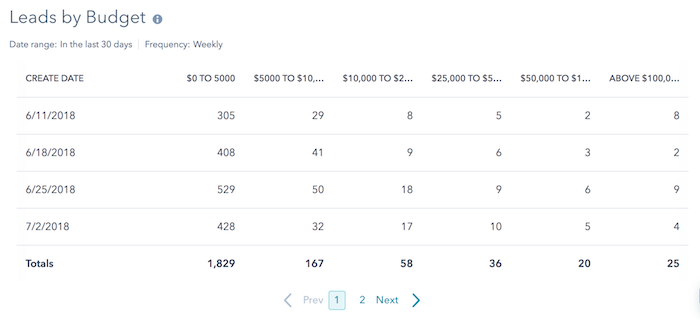
When looking at the table above, keep in mind it shows leads from the U.S. only.
The KISSmetrics blog was merged on the 25th. When you add up all of the numbers from the previous week, there were 469 leads in total, of which 61 were marketing qualified leads.
That means there were 61 leads that the sales reps were able to contact as the vast majority of leads are companies that are too small for us to service.
When you look at the week of the 25th, there were a total of 621 leads. 92 where marketing qualified leads.
Just from that one acquisition, I was able to grow my marketing qualified leads by 50.8%. 🙂
I know what you are thinking though. The week after the 25th (7/2) the leads tanked again. Well, you have to keep in mind that the table only shows leads from the U.S. and during that week there was a national holiday, the 4th of July. So, leads were expected to be low.
But still, even with the holiday, we generated 496 leads, 68 of which where marketing qualified. We still generated more marketing qualified leads than when we didn’t have the KISSmetrics traffic.
The early results show that this is going to work out (or so I hope). If you ever want to consider buying up sites that aren’t generating revenue, you need to know your numbers like the back of your hand.
My sales funnel
Some of you are probably wondering how I promote my agency from this site. As I mentioned earlier, I will share my funnel and stats with you.
The way I monetize the traffic is by collecting leads (and my sales reps turn those leads into customers).
On the homepage, you will see a URL box.
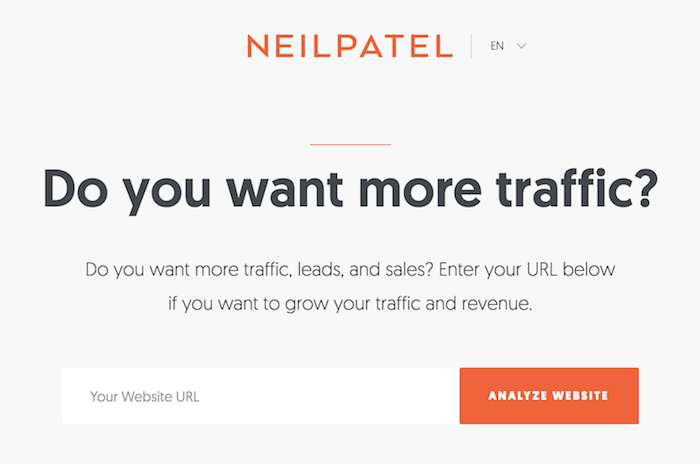
Once you enter a URL, we do a quick analysis (it’s not 100% accurate all of the time).
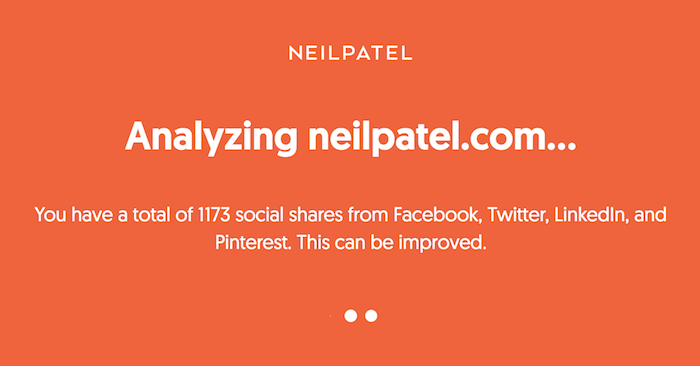
And then we show you how many technical SEO errors you have and collect your information (this is how you become a lead).
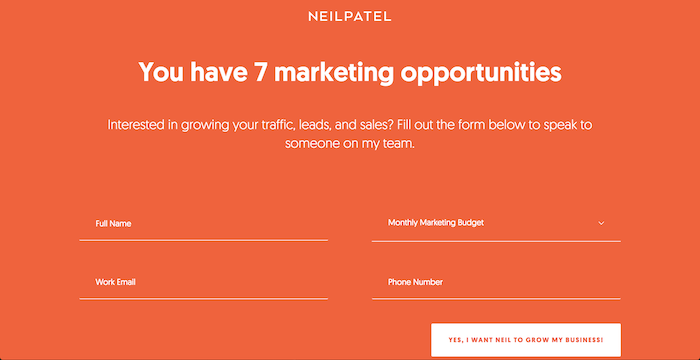
And assuming we think you are a good fit, you see a screen that allows you to schedule a call (less than 18% of the leads see this).
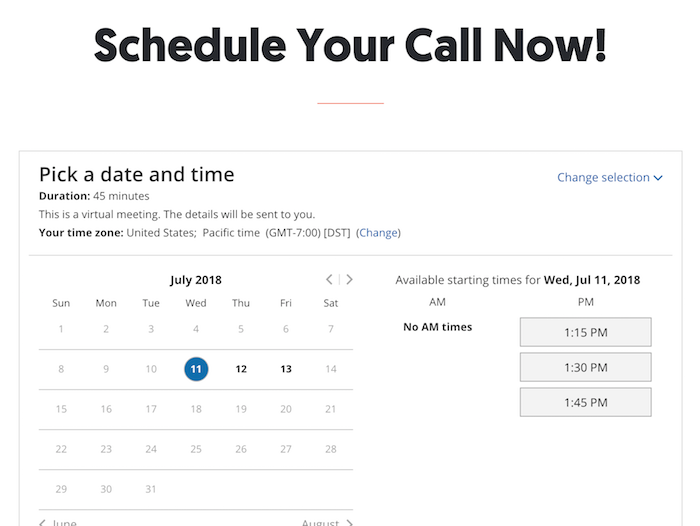
From there someone on my team will do a discovery call with you. Assuming things go well, a few of us internally review everything to double check we can really help, we then create projections and a presentation, and then we pitch you for your money (in exchange for services of course).
That’s the funnel on NeilPatel.com in a nutshell… It’s pretty fine-tuned as well. For example, when someone books a call, we send them text reminders using Twilio to show up to the call as we know this increase the odds of you getting on the phone.
We even do subtle things like asking for your “work email” on the lead form. We know that 9 out 10 leads that give us a Gmail, Hotmail, AOL, or any other non-work email are typically not qualified.
And it doesn’t stop there… there are lead forms all over NeilPatel.com for this same funnel.
If you are reading a blog post like this, you’ll see a bar at the top that looks something like:

Or if you are about to exit, you will see an exit popup that looks like:
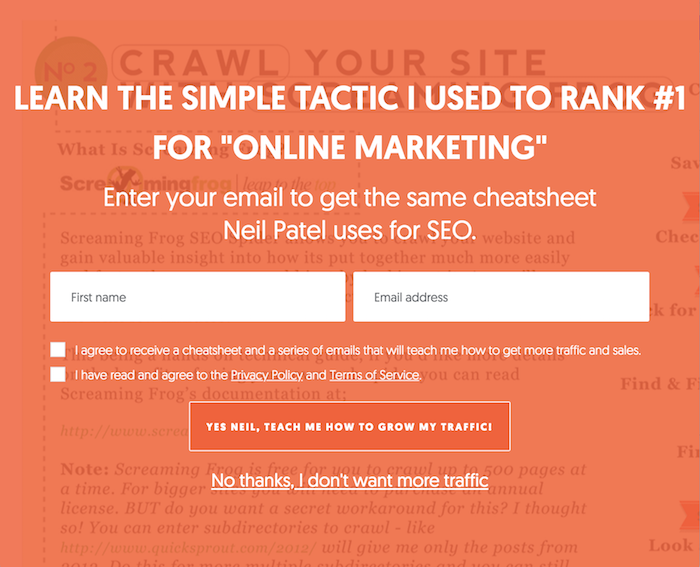
You’ll even see a thank you page that promotes my ad agency once you opt-in:
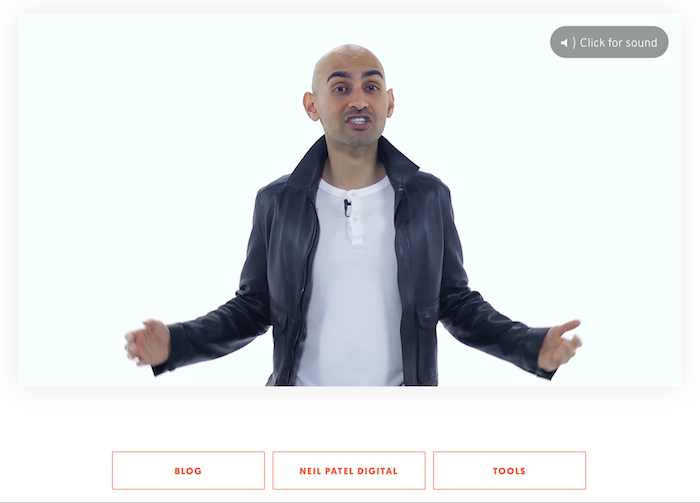
And if I don’t convince you to reach out to us for marketing help right then and there, you’ll also receive an email or two from me about my ad agency.
As you can see, I’ve fine-tuned my site for conversions. So much so, that every 1,000 unique visitors from the U.S. turns into 4.4 leads. And although that may not seem high, keep in mind that my goal isn’t to get as many leads as possible, I’m optimizing for quality over quantity as I don’t want to waste my sales reps time.
For example, I had 2 reps that had a closing ratio of 50% last month. That means for every 2 deals they pitched, 1 would sign up for a 6-figure contract, which is an extremely high closing ratio. Hence, I am trying to focus on quality so everyone in sales can get to 50%, as it makes the business more efficient and profitable.
The last thing you want to do is pay a sales rep tons of money to talk to 50 people to only find 1 qualified lead. That hurts both you and your sales reps.
Conclusion
The strategy I am using to buy websites may seem risky, but I know my numbers like the back of my hand. From an outsider’s perspective it may seem crazy, but to me, it is super logic.
And the reason I buy sites for their traffic is that I already have a working business model. So, buying sites based on their traffic is much cheaper than buying sites for their revenue. In addition to that, my return on investment is much larger.
For example, if I wanted to buy KISSmetrics (the whole business), I would have to spend millions and millions of dollars.
I’m looking for deals, it’s how you grow faster without having to raise venture capital.
When you use this strategy, there is no guarantee you will make a return on your investment, but if you spend time understanding the numbers you can reduce your risk.
I knew that going into this KISSmetrics deal that I will generate at least an extra $500,000 in profit from this one acquisition. Realistically it should be much more than that as the additional leads seem to be of the same quality, and the numbers are penciling out for it to add well into the millions in revenue per year.
But before you pull the trigger and buy up a few sites in your space, there are a few things you need to keep in mind:
- Don’t buy sites that rely on 1 traffic source – you don’t want to buy sites that only have Facebook traffic. Or even Google traffic. Ideally, any site you buy should have multiple traffic sources (other than paid ads) as it will reduce your risk in case they lose their traffic from a specific channel.
- Buy old sites – sites that are less than 3 years old are risky. Their numbers fluctuate more than older sites.
- Spend time understanding the audience – run surveys, dive deep into Google Analytics… do whatever you can to ensure that the site you are buying has an audience that is similar to your current business.
- Be patient and look for deals – I hit up hundreds of sites every month. Some people hate my emails and won’t give me the time of day. That’s ok. I’m a big believer and continually pushing forward until I find the right deal. I won’t spend money just because I am getting antsy.
- Get creative – a lot of people think their site is worth more than it really is. Try to explain to them what it is really worth using data. I also structure deals in unique ways, such as I gave KISSmetrics up to 6 months before they had to transition to a new domain (and to some extent they are still allowed to use the existing domain for their client login area). You can even work out payment plans, seller based financing, or equity deals… you just have to think outside the box.
So, what do you think about my acquisition strategy? Are you going to try it out?
The post Why I Spent $500,000 Buying a Blog That Generates No Revenue appeared first on Neil Patel.
No comments:
Post a Comment